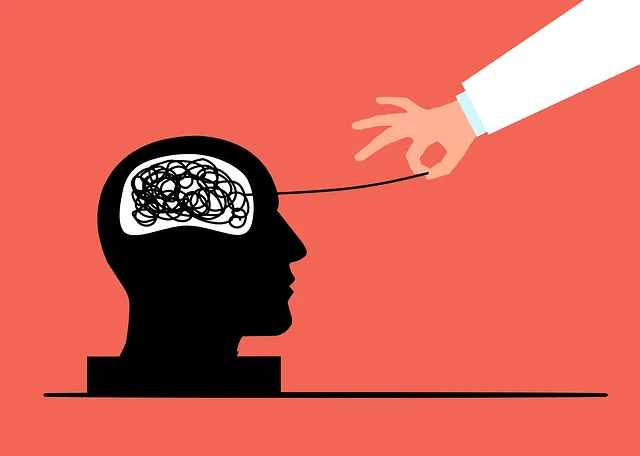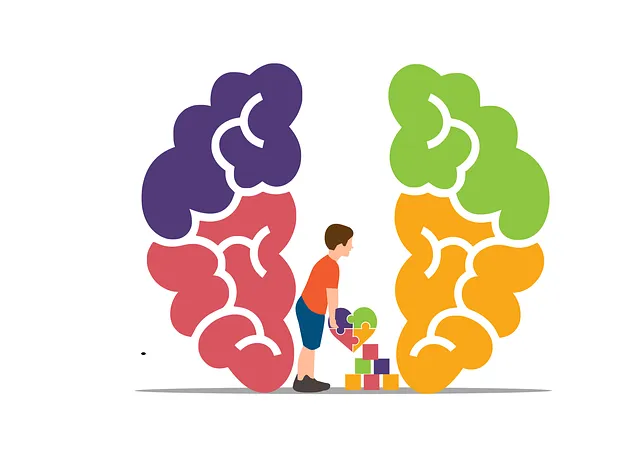Burnout among healthcare providers, particularly in high-stress fields like mental health at Kaiser Permanente Lone Tree, is a growing concern impacting their mental well-being. Recognizing and addressing burnout through training, communication strategies, and stress management techniques (like Mind Over Matter principles) prevents burnout and fosters healthier work environments. Kaiser Permanente prioritizes mental wellness with initiatives such as a confidential mental health support line, self-awareness exercises, cultural competency training, and tailored risk management planning for emotional well-being. Effective burnout prevention strategies include building resilience through self-care, emotional regulation, and stress reduction methods integrated into daily routines. Phone counseling, accessible via the Kaiser Permanente mental health phone number in Lone Tree, is a crucial burnout prevention tool gaining national recognition as essential for healthcare worker mental health and improved patient care.
Healthcare provider burnout is a growing concern, impacting patient care and well-being. This article explores strategies to prevent this crisis, focusing on Kaiser Permanente’s innovative approach to mental health support. We delve into their services, including phone counseling available in Lone Tree, showcasing how organizations are stepping up to combat burnout. By examining effective prevention methods, we aim to highlight the importance of addressing mental health for healthcare professionals, ultimately enhancing patient outcomes and job satisfaction.
- Understanding Burnout Among Healthcare Providers
- Kaiser Permanente's Approach to Mental Health Support
- Effective Strategies for Burnout Prevention
- The Role of Phone Counseling in Lone Tree and Beyond
Understanding Burnout Among Healthcare Providers

Burnout among healthcare providers is a growing concern, impacting mental health and overall well-being. It’s characterized by emotional exhaustion, depersonalization, and a sense of reduced personal accomplishment, often stemming from prolonged exposure to high-stress environments. Healthcare professionals, especially those in demanding fields like mental health, face unique challenges that can lead to burnout if left unaddressed. For instance, workers at Kaiser Permanente in Lone Tree might encounter heavy caseloads, long hours, and complex patient needs, all of which contribute to stress over time.
Recognizing these issues is the first step; understanding that burnout is a symptom of a larger problem is crucial. Social Skills Training and Communication Strategies can play a vital role in prevention. Equipping providers with tools to manage stress, improve resilience, and enhance their connection with patients—through Mind Over Matter Principles, for example—can mitigate risks. These strategies foster a healthier work environment, ensuring professionals maintain their passion and purpose while providing the best care possible.
Kaiser Permanente's Approach to Mental Health Support

Kaiser Permanente, a healthcare organization known for its comprehensive approach to wellness, offers a robust mental health support system designed to combat provider burnout. Their strategy includes a dedicated mental health phone line accessible in locations like Lone Tree, providing easy and confidential support to healthcare professionals. This initiative recognizes the growing importance of mental well-being within the medical community.
The organization also emphasizes the role of self-awareness exercises and healthcare provider cultural competency training as preventive measures. By fostering a culture of open dialogue and encouraging self-reflection, Kaiser Permanente aims to build resilience among its workforce. Additionally, they implement risk management planning for mental health professionals, ensuring that staff have the tools and resources needed to navigate challenging situations while maintaining their emotional well-being.
Effective Strategies for Burnout Prevention

Burnout prevention is a proactive approach that healthcare providers can use to protect their mental well-being and sustain their professional careers. At Kaiser Permanente, for instance, recognizing and addressing burnout has been a priority, especially with services like their mental health phone number in Lone Tree readily available to support staff. Effective strategies include fostering resilience through regular practice of emotional regulation techniques and incorporating stress reduction methods into daily routines.
Professionals can build resilience by engaging in activities that promote self-care, such as mindfulness exercises, physical exercise, and adequate sleep. Emotional regulation skills, like deep breathing, cognitive reframing, and setting personal boundaries, help manage the overwhelming emotions that can lead to burnout. Stress reduction methods, including time management techniques, delegation, and taking regular breaks, are essential for maintaining work-life balance. By integrating these strategies into their lives, healthcare providers can create a buffer against burnout, ensuring they remain effective and compassionate caregivers for their patients.
The Role of Phone Counseling in Lone Tree and Beyond

In today’s demanding healthcare landscape, Lone Tree residents and professionals alike are increasingly turning to phone counseling as a vital burnout prevention strategy. Organizations like Kaiser Permanente offer dedicated mental health support through their phone lines, providing accessible resources for those seeking respite from work-related stress. This confidential service allows healthcare providers to connect with trained counselors who can offer guidance on conflict resolution techniques, mindfulness meditation, and stress management – all essential tools in combating burnout.
Beyond Lone Tree, this trend is gaining traction as a means of addressing the mental health needs of healthcare workers across the nation. By integrating phone counseling into their wellness programs, institutions are recognizing the importance of empowering professionals with effective coping mechanisms. This proactive approach not only enhances job satisfaction but also improves patient care, as well-being providers are better equipped to offer compassionate and attentive service.
Healthcare provider burnout is a pressing issue, but with proactive strategies like those employed by Kaiser Permanente, including mental health support via phone counseling in Lone Tree, we can create a healthier, more sustainable future for medical professionals. By recognizing the signs of burnout and implementing effective prevention tactics, healthcare organizations can foster a culture that prioritizes well-being, ultimately enhancing patient care and the overall quality of the healthcare system. Remember, access to mental health resources, such as the Kaiser Permanente phone number in Lone Tree, is crucial for breaking down barriers to support and recovery.






